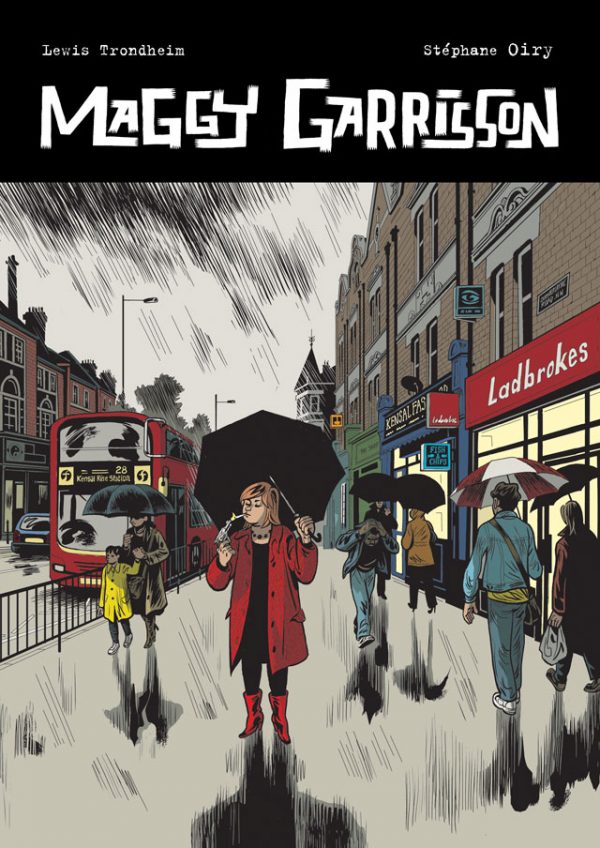Maggy Garrisson
Written by Lewis Trondheim
Illustrated by Stéphane Oiry
Translated by Emma Wilson
SelfMadeHero
The first thing I thought upon finishing Maggy Garrisson was, “What a great TV show this would be!” I don’t often think such things about comics for several reasons.
One is that I don’t think comics require movies or shows based on them for legitimacy and, in fact, I think they often suffer because of them. I think comics are the superior art form and most adaptations of them seldom match the original in quality or effect, and so creatively, don’t serve a purpose. It certainly doesn’t help with expectations of the original in the context of bringing a wider audience to comics.
Another is somewhat related, but more a nuts and bolts consideration. Film and television are just a different creative form than comics and so are executed differently. This means if you find yourself considering that a certain comic would make a great movie or TV show, it’s best to think in terms of the source material rather than a faithful adaptation. Partly this is because of the narrative differences between the forms that require distinctive approaches to what drama and action are visible in the narrative and their pacing. Film editing and sequential paneling are sometimes sold as similar, but I’d say they are only similar despite crucial differents. Also, when you come right down to it, dialogue that reads great in a comic can sound awful spoken by actors.
So with all those hurdles in my brain, Maggy Garrisson flew to the finish with ease, and that’s an indication of not only its important agreeable flow but the way it channels into the plot, the situations, the characterizations, the dialogue, the art. It’s all top of its game work that hits a certain tone in such a specific way that I seldom see comics reach. The book in the most basic terms will not push it to the head of the line in grabbing your attention. It is not dynamic, or dark. It is not self-involved. It does not offer commentary about an issue. It is quiet. It is reasonable. It is insightful in a calm way. Its reminds me partially of the recent wonderful Icelandic film Woman At War, maybe aspects of Killing Eve.
Here’s what the book is about: Maggy Garrisson isn’t doing so well mostly because she’s unemployed. She ends up getting a job assisting a private detective, but he’s got some issues and ends up in the hospital, and she’s left drifting. Maggy is clever and has an enterprising side that leads her to poke her nose into the detective’s cases. In some ways, this puts her out of her depth. In others, it reveals a remarkable talent she never imagined she had. But she’s also juggling this with personal stuff. Not in an overwhelming, melodramatic way. Just some things. And so this all becomes the mix of Maggy’s life. Some things that you don’t think are going to work out actually do. Some others that seem likely go south.
There’s lots of great dialogue, which points directly at the work of translator Emma Wilson, who did such a great job that her work doesn’t seem like something someone did after the fact of creation. Her contribution seems right at the heart of the work to me.
It’s a bit episodic, in that way life can be, but there are also carry-overs. Characters that could be cliches end up being wonderfully-portrayed. Maggy ends up being someone you have an admiration for, while still remaining a normal person. There are lots of wonderful little moments, as well as a few bigger ones, but not so big that they overshadow the journey you’re taking in this narrative, nor the people you are getting to know.
And the art renders this world fully, which is really just our world, but with some potential for a little more than the mundane stuff we always deal with, but always in service to the characters who walk in the world and making sure they are placed within as equals to it, rather than game pieces in a spectacle.
Ironically, Maggy Garrisson is one of those comics that prove to me my basic premise, that no television or movie adaptation is required for legitimacy. Maggy Garrisson is the superior art form.
The bottom line is that this book is really nice and I kind of love it. Surely they’re going to make more of these. Surely.











